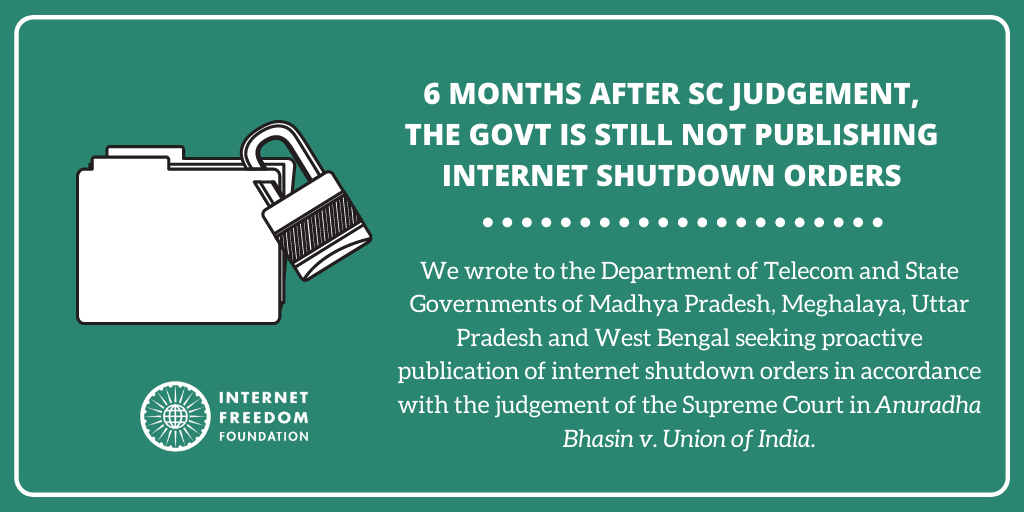
Tl;dr
We wrote to the Department of Telecom and State Governments of Madhya Pradesh, Meghalaya, Uttar Pradesh and West Bengal seeking proactive publication of internet shutdown orders in accordance with the judgement of the Supreme Court in Anuradha Bhasin v. Union of India. The judgement in Anuradha Bhasin v. Union of India was delivered on 10 January, and since then, several states have imposed internet shutdowns without publishing the legal orders under which these internet shutdowns were imposed. Such secrecy is a violation of the Supreme Court's directions and undermines the rule of law.
Background
In Anuradha Bhasin v. Union of India, the Supreme Court was called upon to determine the constitutionality of the communication shutdown imposed in Jammu & Kashmir on 05 August 2019. In its judgement, the Court noted that there were several gaps in the Telecom Suspension Rules 2017 and it read certain procedural safeguards into the Rules to fill this lacuna. You can read a more detailed summary of the judgement here.
Specifically, in para 96 of its judgement, the Supreme Court held that all internet shutdown orders must be proactively published by the government.
“It must be noted that although the Suspension Rules does not provide for publication or notification of the orders, a settled principle of law, and of natural justice, is that an order, particularly one that affects lives, liberty and property of people, must be made available …. We are therefore required to read in the requirement of ensuring that all the orders passed under the Suspension Rules are made freely available, through some suitable mechanism. ”
Recent Internet Shutdowns
After the Supreme Court delivered its judgement in Anuradha Bhasin v. Union of India on 10 January 2020, several states have imposed internet shutdowns but we could not find any copies of the legal orders on official government websites or through media reports for the following instances.
- Madhya Pradesh: On 31.01.2020, mobile internet services were suspended in Jabalpur in anticipation of protests against the Citizenship (Amendment) Act 2019. Although the Deputy Inspector General confirmed the issuance of an internet suspension order by the District Magistrate to a media outlet, we could not find a copy of the order itself in the public domain.
- Meghalaya: On 28.02.2020, mobile internet services were suspended for 48 hours in six districts of Meghalaya after clashes over the Citizenship (Amendment) Act, 2019.
- Uttar Pradesh: On 27.02.2020, mobile internet services were suspended by the District Magistrate for two days in Aligarh after clashes over the Citizenship (Amendment) Act, 2019.
- West Bengal: From 18.02.2020 to 27.02.2020, internet services were supposed to be suspended across seven districts in West Bengal to prevent cheating in Class X Madhyamik exams. You can read more about this here. Further, from 13.05.2020 to 17.05.2020, mobile internet services were suspended in Hooghly after clashes over movement in containment zones.
Importance of Transparency
Publication of internet shutdown orders and proper record-keeping is essential for two reasons. First, without access to internet shutdown orders, citizens cannot exercise their fundamental right to seek judicial review of arbitrary or disproportionate restrictions on internet access. Second, internet shutdowns cause huge economic losses and maintaining a consolidated record of all internet shutdowns imposed at the state and central level is necessary for evidence based policy reform.
Without official publication of orders, the only source of information about internet shutdowns in different parts of the country is media reports. However, the figures derived based on media reports do not represent the full scale of the problem and may fail to include shutdowns which are shorter in duration or localized in small towns and villages.
In any case, even the limited information which is available through media reports suggests that internet shutdowns are being ordered by government officials who are not authorized under the law. For instance, media reports indicate that internet shutdowns in Madhya Pradesh, Uttar Pradesh and West Bengal were ordered by District Magistrates who are not empowered to exercise powers under the Telecom Suspension Rules 2017. Prior to 2017, internet shutdowns were ordered by District Magistrates under Section 144, Code of Criminal Procedure 1973. However, in Anuradha Bhasin v. Union of India, the Supreme Court has clarified that the position of law has changed after notification of the Rules in 2017 and the procedure prescribed under the Rules must be followed prior to imposing internet shutdowns.
Recommendations and Demands
Through this representation, we have formally called upon the Central and State Governments to comply with the directions of the Supreme Court in Anuradha Bhasin v. Union of India and correct past lapses by undertaking the following measures:
- Proactively publish all internet shutdown orders on official government websites and widely disseminate this information through the media.
- Issue an advisory to all District Magistrates clarifying that internet shutdowns can no longer be imposed under Section 144, Code of Criminal Procedure 1973.
- The Central Government should maintain a consolidated repository of all internet shutdown orders issued in different parts of the country and this repository should be made available to the general public.
As we had noted previously noted, the judgement in Anuradha Bhasin v. Union of India is the beginning of a long uphill campaign to reform the legal framework and institutional practices surrounding internet shutdowns in India. This representation is one of the many follow up actions we have undertaken to ensure meaningful enforcement of the judgement and we remain fully committed to sustained advocacy which is necessary to convert principles into practice.
Important Documents
- Representation dated 14.07.2020 to Department of Telecom and State Governments (link)
- Representation dated 03.04.2020 to Ministry of Parliamentary Affairs and Ministry of Law & Justice (link)
- Representation dated 22.02.2020 to the Government of West Bengal (link)
- Summary of judgement in Anuradha Bhasin v. UoI (link)
